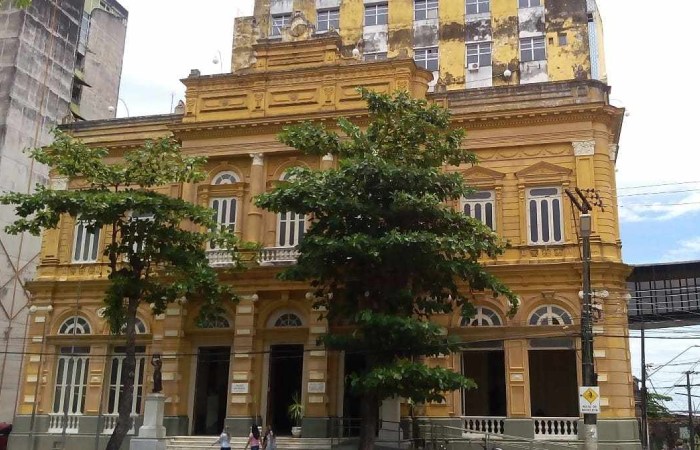HenCasa Do Albergado de Manaus ( 04.312.401/0004-80 Casa Do Albergado de Manaus Null – The Casa do Albergado de Manaus is a minimum-security prison in Manaus, Brazil, that is based on the principles of self-discipline and responsibility. It is designed for prisoners who are serving open-regime sentences or weekend sentences. The prison is directly subordinate to the State Secretariat of Penitentiary Administration (Seap).
Casa do Albergado de Manaus: A Model for Open-Regime Corrections

The CADM’s programs and activities are tailored to the individual needs of each resident. The CADM staff works with residents to develop a personalized rehabilitation plan that will help them achieve their goals.
The CADM is committed to helping its residents to succeed. The CADM’s programs and activities have helped thousands of people to reintegrate successfully into society and to live productive and fulfilling lives.
History
The Casa do Albergado de Manaus was created by Law No. 1694, on July 15, 1985. It was one of the first open-regime prisons in Brazil, and it has served as a model for other prisons in the country.
Mission and Values

The mission of the Casa do Albergado de Manaus is to help prisoners reintegrate into society and become productive members of the community. The prison’s values are based on respect, responsibility, and self-discipline.
Programs and Activities
The Casa do Albergado de Manaus offers a variety of programs and activities to help prisoners reintegrate into society. These programs include:
- Education: The prison offers a variety of educational programs, including basic education, vocational training, and distance learning courses.
- Work: Hence, the prison provides prisoners with the opportunity to work in a variety of fields, including construction, agriculture, and manufacturing.
- Psychological and social support: The prison offers prisoners psychological and social support services to help them cope with the challenges of prison life and prepare for their release.
Success Stories
Hence, the Casa do Albergado de Manaus has a long history of success. Many prisoners who have been released from prison have gone on to become productive members of the community.
However, One example of a success story is the story of Jose. Jose was sentenced to four years in prison for drug trafficking. He served his sentence at the Casa do Albergado de Manaus, where he participated in the prison’s education and work programs. However, after his release, Jose was able to find a job and start a new life. He is now a successful businessman and is married with two children.
Challenges
Despite its successes, the Casa do Albergado de Manaus faces a number of challenges. One challenge is the high rate of recidivism among prisoners who are released from prison. Hence, another challenge is the lack of resources to provide prisoners with all of the programs and services they need.
The Future
Moreover, the Casa do Albergado de Manaus is committed to helping prisoners reintegrate into society and become productive members of the community. The prison is constantly working to improve its programs and services. In the future, the prison hopes to reduce recidivism rates and provide prisoners with even more opportunities to succeed.
Programs and Activities of the Casa do Albergado de Manaus
Henceforth, the Casa do Albergado de Manaus (CADM) is a Brazilian non-profit organization. Moreover, it provides rehabilitation and reintegration services to people who have been incarcerated. The CADM was founded in 1956 and is located in the city of Manaus, in the state of Amazonas.
Moreover, the CADM offers a variety of programs and activities to its residents, including:
- Educational programs: And also the CADM offers a variety of educational programs, including basic literacy and numeracy, secondary education, and vocational training.
- Work programs: The CADM provides residents with the opportunity to participate in work programs, both within the CADM and in the community. Henceforth, these programs help residents to develop their skills and work experience and to earn an income.
- Psychological and counseling services: The CADM offers residents access to psychological and counseling services. Hence, these services help residents to address the underlying issues that contributed to their incarceration and to develop coping mechanisms for dealing with stress and challenges.
- Social and cultural activities: The CADM offers residents a variety of social and cultural activities, such as sports, music, and art. These activities help residents to build relationships with each other and to develop their social skills.
Specific Programs and Activities
Henceforth, the CADM’s programs and activities are designed to help resident. To develop the skills and knowledge they need to reintegrate successfully into society. However, the CADM also works to provide residents with support and resources after they leave the CADM.
Some examples of specific programs and activities at the CADM:
- Educational programs
- Basic literacy and numeracy classes
- Secondary education classes
- Vocational training in carpentry, metalworking, and other trades
- Work programs
- Work in the CADM’s kitchen, bakery, and other workshops
- Work in the community on construction projects, landscaping projects, and other jobs
- Psychological and counseling services:
- Individual and group counseling
- Psychological testing and assessment
- Social and cultural activities
- Sports teams and leagues
- Music and art classes
- Cultural events and festivals
Conclusion
Henceforth, Casa Do Albergado de Manaus ( 04.312.401/0004-80 Casa Do Albergado de Manaus Null is a model for open-regime corrections. However, the prison’s programs and activities help prisoners reintegrate into society and become productive members of the community.

















